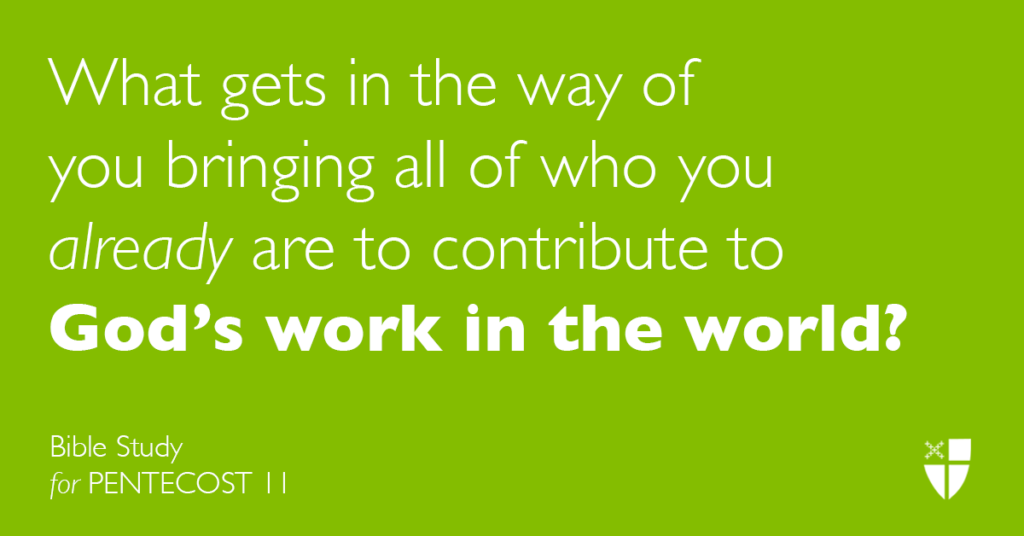This page is available in: Español
Bible Study: Proper 16 (C) – 2019
August 25, 2019
Jeremiah 1:4-10

When I read this passage in Jeremiah, there is one line that immediately captures and convicts me: “Ah, Lord God! Truly I do not know how to speak, for I am only a boy” (Jeremiah 1:6). Jeremiah’s response to God sounds so familiar. It brings to mind Moses’ doubts when God calls him to lead the Israelites out of Egypt: “Who am I that I should go to Pharaoh, and bring the Israelites out of Egypt?” (Exodus 3:11). Despite God’s promise to remain with him, Moses persists: “O my Lord, I have never been eloquent, neither in the past nor even now that you have spoken to your servant; but I am slow of speech and slow of tongue” (Exodus 4:10).
But Jeremiah’s response also sounds familiar because of what resounds in my own head. When I feel the Holy Spirit’s persistent tug on my heart, giving me work to do and an opportunity to say “Yes,” I instead reply, “But I am not good enough!” And then upon further reflection, I insist, “Are you sure? I think someone else would be better.”
There are many excuses we might give:
“I am only a girl.”
“I am not even a high school graduate.”
“I am too old.”
But judging from the Hebrew Bible, the job of the prophets is straightforward: to call attention to what they see around them and to draw people back towards God. This role takes courage and the gift of paying attention, but beyond those qualifications, God seems to desire only a willingness to show up as we are, ready to be a part of God’s work in the world. With these meager qualifications, God can do big things: pluck up and pull down, destroy and overthrow, build and plant.
- To what might God be inviting you to pay attention?
- What gets in the way of you bringing all of who you already are to contribute to God’s work in the world?
Psalm 71:1-6
In this short selection of Psalm 71, God is a refuge, a rock, a castle, a crag, and a stronghold. These concrete, tangible images lead the psalmist to the intangible—hope, confidence, and strength. And this sense of God’s stability, steadiness, and safety means the psalmist can make demands of God: “Let me never be ashamed,” “deliver me,” “set me free,” “incline your ear to me,” “save me.” The psalmist’s experience of God since birth as a steady companion has created an intimate, trusting relationship in which the psalmist can voice their deepest desires with hope and confidence.
- The psalmist uses “rock,” “crag,” and “stronghold” as tangible images for the safety and security God provides. What are some concrete images from your own experience you could use?
- When you reflect on these metaphors for God, what might they inspire you to ask for—even demand as the psalmist does—in your prayer?
Hebrews 12:18-29
From the tangible weight of Psalm 71’s metaphors we move to the mystical imagery of Hebrews, and yet there is still a theme of God’s steadiness. The author writes, “This phrase, ‘Yet once more,’ indicates the removal of what is shaken—that is, created things—so that what cannot be shaken may remain. Therefore, since we are receiving a kingdom that cannot be shaken, let us give thanks, by which we offer to God an acceptable worship with reverence and awe” (Hebrews 12:27-28). Hebrews does not shy away from addressing human foibles and frailties, yet this chapter ends with an emphasis on “what cannot be shaken”—that is, the kingdom of God. When our worldly kingdoms seem battered by corruption, greed, and misuse of power, Hebrews reminds us that there is a kingdom very near us that remains, steady and unshaken. This chapter begins with the well-loved phrase “Therefore, since we are surrounded by so great a cloud of witnesses” (Hebrews 12:1) and is immediately followed by “Do not neglect to show hospitality to strangers, for by doing that some have entertained angels without knowing it” (Hebrews 13:2). I take these bookends of this section as reminders that there are signs of God’s unshakable kingdom all around us, and for that I give thanks.
- What signs of God’s kingdom do you see in the midst of our worldly kingdoms?
Luke 13:10-17
I cannot help but wonder about the woman in this story. She was bent over, unable to stand up straight for eighteen years. Eighteen years of getting around without ever being able to look someone in the eye, except maybe the occasional child or pet dog. Eighteen years of doing whatever work she could manage, and eighteen years of being overlooked by those standing tall around her. I imagine that those around her got used to seeing her that way—or maybe they didn’t see her at all anymore. Maybe even she had grown accustomed to a life in which her eyes were perpetually cast downward. But Jesus sees her. He sees her with fresh eyes and immediately invites her over and speaks to her. With his touch, she is able to stand up straight, free and tall. It is nothing short of miraculous what truly seeing someone can offer to them.
- As you go about your day, try to see with fresh eyes. What or who do you see that you might otherwise have overlooked?
- Who could benefit from your taking a moment to truly see them?
This page is available in: Español
Don’t forget to subscribe to the Sermons That Work podcast to hear this sermon and more on your favorite podcasting app! Recordings are released the Thursday before each liturgical date.
Receive Free Weekly Sermons That Work Resources!
This page is available in: Español


